常用口语(ColloquialEnglish)
278句常用英语口语可直接打印
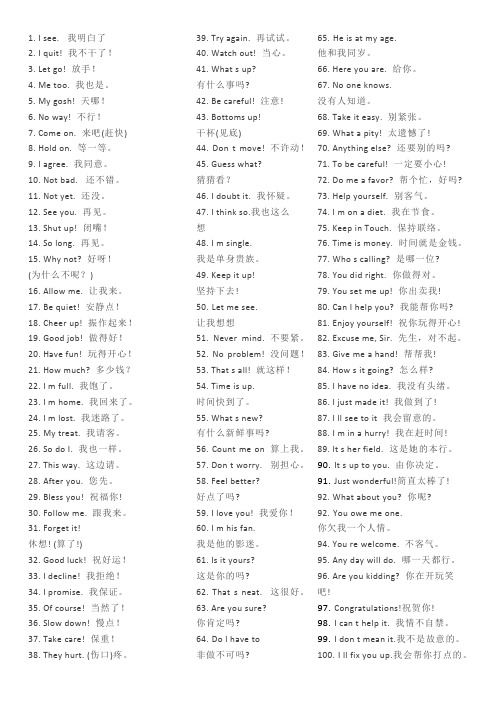
1. I see. 我明白了2. I quit! 我不干了!3. Let go! 放手!4. Me too. 我也是。
5. My gosh! 天哪!6. No way! 不行!7. Come on. 来吧(赶快)8. Hold on. 等一等。
9. I agree. 我同意。
10. Not bad. 还不错。
11. Not yet. 还没。
12. See you. 再见。
13. Shut up! 闭嘴!14. So long. 再见。
15. Why not? 好呀!(为什么不呢?)16. Allow me. 让我来。
17. Be quiet! 安静点!18. Cheer up! 振作起来!19. Good job! 做得好!20. Have fun! 玩得开心!21. How much? 多少钱?22. I m full. 我饱了。
23. I m home. 我回来了。
24. I m lost. 我迷路了。
25. My treat. 我请客。
26. So do I. 我也一样。
27. This way. 这边请。
28. After you. 您先。
29. Bless you! 祝福你!30. Follow me. 跟我来。
31. Forget it!休想! (算了!)32. Good luck! 祝好运!33. I decline! 我拒绝!34. I promise. 我保证。
35. Of course! 当然了!36. Slow down! 慢点!37. Take care! 保重!38. They hurt. (伤口)疼。
39. Try again. 再试试。
40. Watch out! 当心。
41. What s up?有什么事吗?42. Be careful! 注意!43. Bottoms up!干杯(见底)44. Don t move! 不许动!45. Guess what?猜猜看?46. I doubt it. 我怀疑。
英语的口语化表达
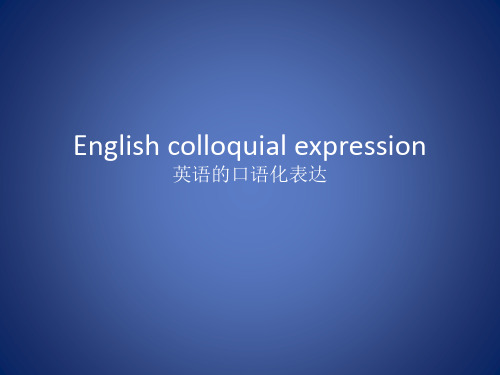
• 3. all over sb. (十分)喜欢,(恨不得)往 身上贴 • 剧中Chandler对Monica说“Phoebe is all over me”,表示“喜欢得不得了,恨不得扑上去 贴着”,也可以说“have a crush on sb"。如: • I‘m all over you.(=I have a crush on you.) 我对 你非常地着迷。
• 7. You've got me (there)! 你难倒我了! • -- How many miles is five kiolmeters? 五千米 是多少英里? • -- You've got me there. 这个问题可难倒我了。 • 8. steal one's thunder 抢了某人的风头,抢 在某人之前成功 • 比如朋友聚会,当你正想宣布一条爆炸性 新闻时,好友抢在你之前宣布了,就可以 说“He steals my thunder".
English colloquial expression
英语的口语化表达
• 1. hang out here 呆在这 • 这是一个俚语。朋友之间相处,像剧中一群好 友一样一齐和咖啡,一起在Monica家聊天,就 是hang out。 • 2. be for the best 表示“(某件事情)可能并不 像看上去那么糟,也许会出现转机,向好的方 面发展”。 • 这是一个极其口语化的表达。如: to leave him, but it's for the best. 我知道让你离开他很难,但或许这对 你们是最好的。
• 9. The glass is half empty. 悲观的
• 有这样一个比喻:有一只水杯装了一半的 谁,乐观者认为”谁杯有一半是满的“, 悲观者则认为“水杯有一半是空的”,于 是就用"The glass is half empty"来表示“悲 观的”意思。
会议英语
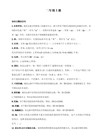
⑤ 有听众的场合,所采用的表达法,应使听众能够确实地接受。
第三讲:会议英语的特征(二)
2.语言学上的特征
首先由它是口头英语这一点,来和书信英文做一个比较,而举出基基本的特征;再列举说明使用正式英语、一般英语、非正式英语等各个情况时的特征;最后,再详加探讨语言学的重要特征。
会议英语的特征
第一讲:英语的种类和会议英语的地位
英语在语言学上原为一种语言,但现在却因各国历史、政治、地理等因素的不同,大致说来有联合王国(The United Kingdom即英语)、英属联邦的澳洲、纽西兰等,以及南非共和国(1961年脱离英属联邦)等国使用的「英语」(或称英式英语),和美国使用的「美语」(或称美式英语)两种。在会话、书写、发音等方面都有很大的差别。而不论是英语或美语,即使在本国的同一个地区,也因为使用人的教育程度、社会地位、职业,或使用的场合、环境等种种的不同,而在发音、句型、文法、会话、书写等方面都有差异。例如,美国或英国的大学教授在官学术性论文时,使用「正式英语」(Formal
(受较少学校教育者的日常用语)
Typical uses: conversation at home, with friends, on the job
(典型用例:家庭、朋友间、工作场合上的谈话)
第二讲:会议英语的特征(一)
会议英语的主体为口头英语,但和口语中代表性的日常会话用语,在格调上又有很大的差异。如上表所示会议英语是以标准英语(Standard English)中的正式英语(Formal English)和一般英语(General English)为主体,有时看情况也可用非正式英语(Informal English),但非标准英语(Nonstandard English)却绝对不用。以国际学术会议来说,开幕、闭幕、颁奖典礼上的致辞、宣言等较正式的场合,都用正式英语。各种演讲、及以读稿方式发表的一般学术演讲,则可用正式英语或一般英语,但即席式演讲则多用一般英语,讨论会上也是用一般英语。在宴会、餐会等以友谊为目的的场合中,即使刚开始时是以一般英语来交谈的人,也会因气氛的关系而逐渐变成用非正式英语;初见面的外国友人间,也会像多年好友般用通俗的会话方式来交谈。
英语成语故事

陈玉泉
英语成语来源与分类
英语成语是英语词汇中的重要精华部分(part and parcel)。社会生活的各个方面是英语成语取之不 尽的源泉(Idioms from Society),当代英语中最 常用的成语有4000余条。许多常用的英语成语来自 《圣经》(Bible)和莎士比亚(Shakespeare)等文 学名著。英语成语主要是口语,而汉语成语主要是 书面语;English idiom 字数不固定,而汉语成语多 为四字词组。下面分广义和狭义来论述英语成语。
1. 谚语、格言(proverb),警句 (sentence idiom)
例如: 英语谚语常有缩写形式,类似汉语的歇后语。 例如: It' s no use crying over spilt milk.倒翻牛奶, 哭也没用。缩写形式:Cry over spilt milk. 含 覆水难收。 义:______
作业
two heads are better than one 三個臭皮匠勝過一個諸葛亮 —— two can play that game —— 以其人之道還治其人之身 kill two birds with one stone __ 一石兩鳥;一箭雙雕;一舉兩得 a flea in one's ear _ 刺耳的話;不受歡迎的構想或答覆
2. 俚语(slang)。
例如: 俚语为某些人群和地区所特有,适用范围有严 格限制,使用时要注意其使用的得体性和意义 的准确性。例如: 1)screw(螺璇钉) up___________ 弄糟、一塌胡涂 Eg.He screwed the whole thing up from start to finish. 他自始至终一塌胡涂。 贿赂 与异性搭讪 2)Pay off _____;chat up_______
常见英语口语俚语介绍

常见英语口语俚语介绍一、IntroductionWhen it comes to speaking English, it's important to know not just the formal and academic phrases, but also the commonly used informal, slang or colloquial expressions. These expressions are often used in casual situations and conversations. They are not usually taught in textbooks or language classes, but they are essential for developing a natural and fluent communication style. In this article, we'll explore some of the most common English slang expressions that you should know.二、Greetings and Conversation Starters1. What's up? - This is a casual way to say hello. It's similar to "How are you?" or "What's new?" It's usually used among friends or peers.2. Long time no see - This is a way of greeting someone you haven't seen in a while. It's a bit old-fashioned, but still commonly used.3. How's it going? - This is a more polite variant of "What's up?" that you can use in formal situations or with people you don't know well.4. Hey there! - This is a friendly way of saying hello. It's often used in a cheerful or upbeat tone.5. Howdy - This is a regional expression that's commonly used in the southern United States. It means "hello" or "welcome".三、Expressions of Agreement and Approval1. Right on! - This is a way of expressing agreement or approval.It's often used in response to good news or positive developments.2. You got it! - This is another way of agreeing or saying "yes". It's often used in response to a request or question.3. Sounds good - This is a way of expressing agreement or approval of a plan or suggestion.4. Totally - This is a casual way of saying "completely" or "absolutely" and can be used to express agreement.5. That's awesome! - This is a way of expressing awe or excitement about something. It's often used in response to good news or a positive experience.四、Expressions of Disagreement and Disapproval1. No way! - This is a way of expressing surprise or disbelief. It's also used to express strong disagreement or refusal.2. I beg to differ - This is a polite way of saying "I disagree". It's often used in a formal or academic setting.3. Are you kidding me? - This is a casual way of expressing disbelief or surprise. It can also be used to express annoyance or disbelief.4. That's not cool - This is a way of expressing disapproval or disappointment about something someone did.5. I'm not feeling it - This is a way of expressing a lack of enthusiasm or interest about something.五、Expressions of Confusion and Uncertainty1. Say what? - This is a way of expressing confusion or asking someone to repeat something they just said.2. I'm lost - This is a way of expressing confusion or uncertainty about a situation or location.3. I'm not sure - This is a way of expressing uncertainty or indecisiveness about something.4. I'm drawing a blank - This is a way of saying you can't remember something or think of anything.5. It beats me - This is a casual way of saying you don't know the answer to a question.六、ConclusionKnowing these common English slang expressions can be helpful in both casual and professional settings. They help you sound morenatural and fluent in conversations with native speakers. However, it's important to remember that using too much slang or colloquial phrases can come across as unprofessional or inappropriate in some settings. It's always important to consider the context and audience when using these expressions.。
词汇的修辞

Task 3ຫໍສະໝຸດ Acquired Immune Deficiency Syndrome is a major deal all over the world. AIDS is a major issue over the world. The disease gets around primarily by sexual intercourse, exchange of bodily fluids, shared needles, and blood transfusion. …is transmitted… Those who think the disease is limited to homos and druggies are quite mistaken. …homosexuals… drug abusers
Dialects
Social dialect is a variety of language associated with a social group such as a social class(社会阶层), an age group, etc. 社会方言指的是语言的使用因各种社会因素 的不同而发生变化,形成变体,语言的变体就是社会 方言。
Slang is a kind of informal language consisting of words and expressions that are not considered appropriate for formal occasions; often vulgar(粗俗的). 俚语使用得是否恰当,一定要考虑使用的目的、场合和使 用者的态度。 在俚语流行范围内,使用俚语可能会取得更生动形象的效 果; 但多数俚语的意思不是很精确,不能用于有效话语中,因 此一般不适合用于大学写作和商务信函等场合。 E.g. Many students start out pretty together but then get weird. Many students start out with clear goals but then lose their direction.
高中英语口语考试试题

高中英语口语考试试题Part A: Self-introduction and Daily Life (30 points)1. Please introduce yourself, including your name, age, and school. (3 points)My name is Li Hua, I am 16 years old, and I am a student at Xinhua High School.2. Describe your daily routine, including your study time and hobbies. (6 points)I usually wake up at 6:30 am and start my day with morning exercises. After that, I spend an hour reviewing English vocabulary before school starts. During lunchtime, I often listen to English podcasts to improve my listening skills. In the evening, I dedicate two hours to complete my homework and an additional hour to read English novels or watch English TV shows to enhance my language proficiency. As for hobbies, I enjoy playing basketball and practicing calligraphy.3. Share your favorite English movie or TV show and explain why. (5 points)My favorite English TV show is "Friends." It not only entertains me but also helps me learn colloquial English and cultural nuances. The humor and relatable situations make the language learning process enjoyable.4. Talk about a recent event in your life that you found memorable. (6 points)Last month, I participated in the school's English debate competition. It was a challenging yet rewarding experience. I had to research extensively on the topic of environmental protection and articulate my points in English. The preparation and the actual debate sharpened my languageskills and public speaking abilities.5. Describe a place you would like to visit and explain why.(5 points)I have always wanted to visit London, England. The city'srich history, iconic landmarks like the Tower Bridge and Buckingham Palace, and its vibrant culture appeal to me. Moreover, immersing myself in the English-speaking environment would greatly improve my language skills.6. Discuss the importance of learning English and your future plans involving the language. (5 points)English is a global language that opens doors to various opportunities, from education to career advancements. My future plans include applying for universities abroad where English is the medium of instruction. I also aim to work in a multinational corporation where I can utilize my English proficiency to contribute to global projects.Part B: Social Issues and Opinions (40 points)1. Express your views on the use of mobile phones in schools.(10 points)While mobile phones can be beneficial for educational purposes, such as accessing online resources, I believe their use should be regulated in schools. Excessive use can lead todistractions and negatively impact students' concentrationand learning outcomes.2. Discuss the role of technology in education and its impact on students. (10 points)Technology has revolutionized education by making information more accessible and interactive. Online learning platformsand educational apps have become essential tools for students, enhancing the learning experience. However, it is crucial to balance technological engagement with traditional learning methods to ensure a well-rounded education.3. Share your thoughts on environmental protection and what actions you think individuals can take. (10 points) Environmental protection is a collective responsibility. Individuals can contribute by adopting sustainable practices such as reducing waste, conserving energy, and supportingeco-friendly products. Small actions, when multiplied by many, can lead to significant positive changes.4. Talk about the influence of social media on teenagers and suggest ways to manage it. (10 points)Social media has become an integral part of teenagers' lives, providing platforms for communication and self-expression. However, it can also lead to issues like cyberbullying and privacy concerns. To manage its influence, teenagers shouldbe educated about responsible online behavior and the importance of maintaining a balance between virtual and real-life interactions.Part C: Imagination and Creativity (30 points)1. Describe a futuristic invention you wish to see and how it would benefit society. (10 points)I envision a device that can convert plastic waste into clean energy. This invention would help address the global plastic pollution problem while simultaneously providing asustainable energy source, contributing to environmental conservation and economic development.2. If you could travel back in time, which historical event would you like to witness and why? (10 points)I would like to witness the signing of the Magna Carta in 1215. This pivotal event in history laid the foundation for modern democracy and the rule of law. Observing the negotiations and the atmosphere of that era would be enlightening and provide a deeper understanding of our legal systems' evolution.3. Create a short story in English involving a character witha unique ability. (10 points)Once upon a time, in a small village, there lived a girl named Mia who had the extraordinary ability to communicatewith animals. This unique gift allowed her to understand the creatures' needs and help resolve conflicts between humansand animals, promoting harmony and coexistence in her community.By addressing these topics, students can demonstrate their English speaking skills, covering a range of personal, social, and creative subjects. This format encourages comprehensivelanguage use and critical thinking, preparing them for various speaking scenarios in their academic and。
词汇学2
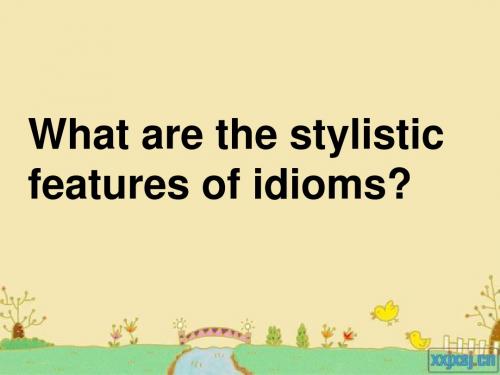
Finally, The same idiom may show stylistic differences when it is assigned different meanings.
screw up Going to the dentist never seems to bother my wife, but I get terribly screwed up (焦虑 at the 焦虑) 焦虑 mere thought. informal
Informal
The old woman has bags of money. (bags of 作“大量”讲) 句意:那个老妇人有很多的 钱。 She cooked his goose by giving away his secret.(cook one's goose作"彻底毁坏别人的 希望"讲) 句意 : 由于泄露了他的秘密,她彻底 毁灭他的希望。
We should never have left the arrangement to Smithers, he screwed the whole thing up(搞砸) (搞砸) from start to finish.
slang
With an impatient exclamation Peter screwed up (揉成一团 揉成一团)the second 揉成一团 draft of his letter to the bank and threw it into the wastepaper basket. no particular stylistic coloring
Features
vivid easily understood easily acceptable
英语口语词组练习
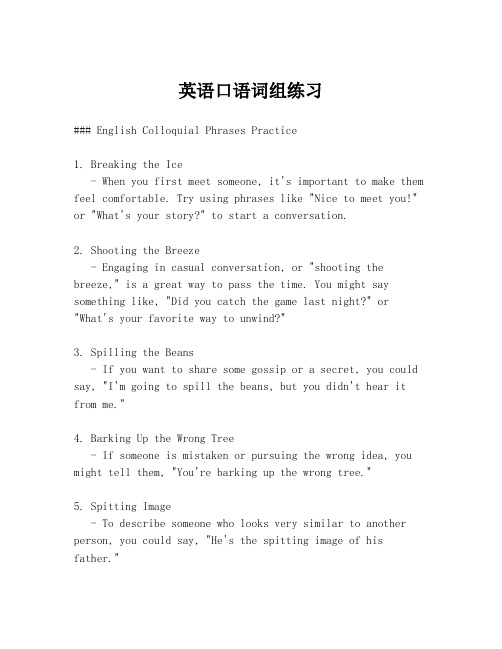
英语口语词组练习### English Colloquial Phrases Practice1. Breaking the Ice- When you first meet someone, it's important to make them feel comfortable. Try using phrases like "Nice to meet you!" or "What's your story?" to start a conversation.2. Shooting the Breeze- Engaging in casual conversation, or "shooting the breeze," is a great way to pass the time. You might say something like, "Did you catch the game last night?" or "What's your favorite way to unwind?"3. Spilling the Beans- If you want to share some gossip or a secret, you could say, "I'm going to spill the beans, but you didn't hear it from me."4. Barking Up the Wrong Tree- If someone is mistaken or pursuing the wrong idea, you might tell them, "You're barking up the wrong tree."5. Spitting Image- To describe someone who looks very similar to another person, you could say, "He's the spitting image of his father."6. Burning the Midnight Oil- If you're working late into the night, you might be "burning the midnight oil."7. Cry Over Spilt Milk- When someone is upset over something that can't be changed, you could tell them not to "cry over spilt milk."8. Hit the Nail on the Head- If someone makes a very accurate point, you could say, "You've hit the nail on the head."9. Let the Cat Out of the Bag- If someone accidentally reveals a secret, it's likethey've "let the cat out of the bag."10. Once in a Blue Moon- To describe something that happens very rarely, you could say, "It only happens once in a blue moon."11. Piece of Cake- If something is very easy, you might say, "It's a piece of cake."12. Throw in the Towel- To give up on something, you could say, "I'm throwing in the towel."13. Under the Weather- If someone is feeling ill, you might ask, "Are you feeling under the weather?"14. You Can Say That Again- If you strongly agree with something, you could say, "You can say that again."15. Bite the Bullet- When you have to face a difficult situation, you might have to "bite the bullet."Practice these phrases in various contexts to become more comfortable with English colloquialisms. Remember, the key to mastering any language is practice and exposure to native speakers. Happy practicing!。
晨梅梅《新发展英语综合教程(1)》学习指南【词汇短语+课文精解+全文翻译+练习答案】(Unit1——

音:丝栏梯,铁丝栏着的梯子,斜的,所以需要拦着
1 / 53
圣才电子书 十万种考研考证电子书、题库视频学习平台
emphasis [
n. 强调,重点
【例句】Some schools lay special emphasis on language study. 有些学校特别重视语
【词组】time inconsistency 时间不一致性,时间矛盾
attempt [
] n. 努力,尝试,企图
vt. 尝试,企图
【例句】I attempted to read the entire novel in one sitting. 我试图一次读完整本小说。
【词组】attempt on sb’s life 企图杀害某人
madly adv. 疯狂地;发狂地;精神失常地
madness n. 疯狂;愚蠢的行为
inconsistency
n. 前后不一致;矛盾
【例句】She noticed several minor inconsistencies in his argument. 她觉察到他的论
点有几处略微有些自相矛盾。
thumb down 贬低;拒绝,责备 thumbs up/down 表示成功或赞许[失败或拒绝] 的用语或手势) 【助记】由于该词和词义为“总数”的单词 sum 读音相近,则可记成:挑起大拇指(thumb), 意味着总数(sum)。
colloquial style 口语体
【助记】col + loqu 说→一起说→口语会话。col 共同,1oqu 说—共同说的话—口语的。
pick up 拾起;用车载;获得;好转;继续
slant
vi. 倾斜,使倾斜;倾向;有倾向性地报
英语口语词汇的类型
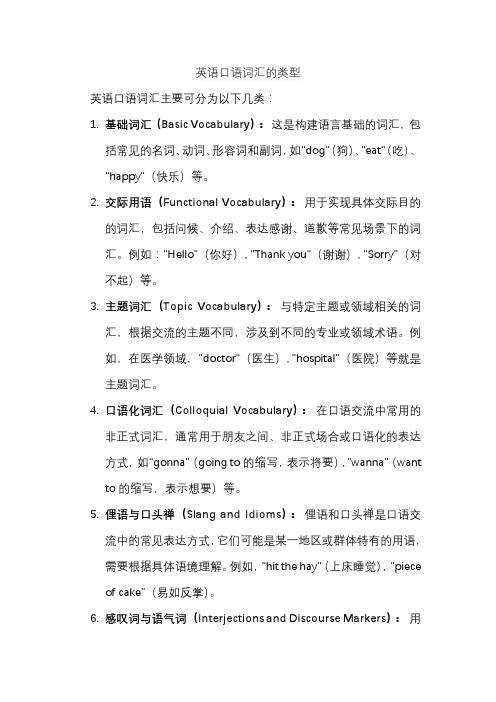
英语口语词汇的类型英语口语词汇主要可分为以下几类:1.基础词汇(Basic Vocabulary):这是构建语言基础的词汇,包括常见的名词、动词、形容词和副词,如"dog"(狗)、"eat"(吃)、"happy"(快乐)等。
2.交际用语(Functional Vocabulary):用于实现具体交际目的的词汇,包括问候、介绍、表达感谢、道歉等常见场景下的词汇。
例如:"Hello"(你好), "Thank you"(谢谢), "Sorry"(对不起)等。
3.主题词汇(Topic Vocabulary):与特定主题或领域相关的词汇,根据交流的主题不同,涉及到不同的专业或领域术语。
例如,在医学领域,"doctor"(医生), "hospital"(医院)等就是主题词汇。
4.口语化词汇(Colloquial Vocabulary):在口语交流中常用的非正式词汇,通常用于朋友之间、非正式场合或口语化的表达方式,如"gonna"(going to的缩写,表示将要), "wanna"(want to的缩写,表示想要)等。
5.俚语与口头禅(Slang and Idioms):俚语和口头禅是口语交流中的常见表达方式,它们可能是某一地区或群体特有的用语,需要根据具体语境理解。
例如,"hit the hay"(上床睡觉),"piece of cake"(易如反掌)。
6.感叹词与语气词(Interjections and Discourse Markers):用于表达强烈情感、感叹或引导交流的词汇。
例如,"Wow"(哇),"Well"(嗯)。
7.口音和发音(Accent and Pronunciation):口音和发音也是口语表达中重要的一部分。
英语“太贵”的口语讲法
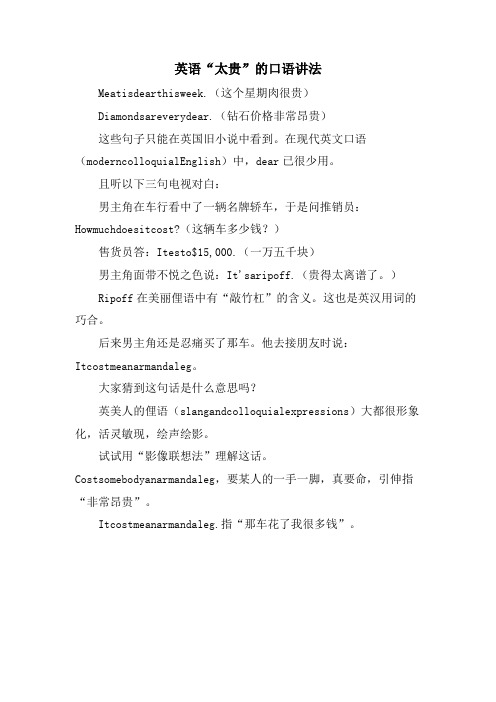
英语“太贵”的口语讲法
Meatisdearthisweek.(这个星期肉很贵)
Diamondsareverydear.(钻石价格非常昂贵)
这些句子只能在英国旧小说中看到。
在现代英文口语(moderncolloquialEnglish)中,dear已很少用。
且听以下三句电视对白:
男主角在车行看中了一辆名牌轿车,于是问推销员:Howmuchdoesitcost?(这辆车多少钱?)
售货员答:Itesto$15,000.(一万五千块)
男主角面带不悦之色说:It'saripoff.(贵得太离谱了。
)
Ripoff在美丽俚语中有“敲竹杠”的含义。
这也是英汉用词的巧合。
后来男主角还是忍痛买了那车。
他去接朋友时说:Itcostmeanarmandaleg。
大家猜到这句话是什么意思吗?
英美人的俚语(slangandcolloquialexpressions)大都很形象化,活灵敏现,绘声绘影。
试试用“影像联想法”理解这话。
Costsomebodyanarmandaleg,要某人的一手一脚,真要命,引伸指“非常昂贵”。
Itcostmeanarmandaleg.指“那车花了我很多钱”。
便宜和太贵的口语说法
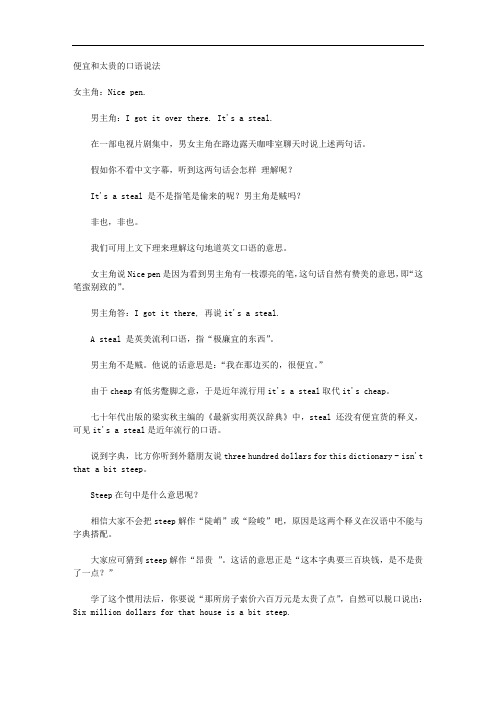
便宜和太贵的口语说法女主角:Nice pen.男主角:I got it over there. It's a steal.在一部电视片剧集中,男女主角在路边露天咖啡室聊天时说上述两句话。
假如你不看中文字幕,听到这两句话会怎样理解呢?It's a steal 是不是指笔是偷来的呢?男主角是贼吗?非也,非也。
我们可用上文下理来理解这句地道英文口语的意思。
女主角说Nice pen是因为看到男主角有一枝漂亮的笔,这句话自然有赞美的意思,即“这笔蛮别致的”。
男主角答:I got it there, 再说it's a steal.A steal 是英美流利口语,指“极廉宜的东西”。
男主角不是贼。
他说的话意思是:“我在那边买的,很便宜。
”由于cheap有低劣蹩脚之意,于是近年流行用it's a steal取代it's cheap。
七十年代出版的梁实秋主编的《最新实用英汉辞典》中,steal还没有便宜货的释义,可见it's a steal是近年流行的口语。
说到字典,比方你听到外籍朋友说three hundred dollars for this dictionary - isn't that a bit steep。
Steep在句中是什么意思呢?相信大家不会把steep解作“陡峭”或“险峻”吧,原因是这两个释义在汉语中不能与字典搭配。
大家应可猜到steep解作“昂贵”。
这话的意思正是“这本字典要三百块钱,是不是贵了一点?”学了这个惯用法后,你要说“那所房子索价六百万元是太贵了点”,自然可以脱口说出:Six million dollars for that house is a bit steep.除了steep,指“昂贵”的常用英文单词有四:expensive, costly, pricey,dear。
五六十年代常在教科书看到的dear现在已甚少听到外国人用了。
语言的名词解释举例英文

语言的名词解释举例英文语言是人类最重要的交流工具之一,通过语言我们能够表达自己的思想、感情和需求。
然而,并非每个人都对语言的定义和相关名词有着清晰的理解。
在本文中,将对语言相关名词进行解释,并附上举例英文,以帮助读者更好地理解和使用。
一、语言语言是一种符号系统,用于交流思想、感情、知识和信息。
它由单词和语法规则组成,并且通常有讲、写、听、读等方面。
以下是一些相关词汇:1. 单词(Word)单词是语言的基本单位,用来表示一个概念或事物。
例如,英文中的 "apple"(苹果)就是一个单词。
2. 语法(Grammar)语法是一套规则,用于构建和组织单词以及句子。
它涉及词类、句法结构、时态、语态等。
例如,英文中的主谓宾结构 "I eat an apple"(我吃一个苹果)就是一种基本的语法结构。
二、语言类型世界上存在许多不同的语言类型,每种语言都有其独特的特点和结构。
以下是一些常见的语言类型:1. 汉语(Chinese)汉语属于孤立语类型,它使用汉字作为书写系统。
例如,"你好" 在英文中的拼写是"nǐ hǎo",意思是"Hello"。
2. 英语(English)英语属于屈折语类型,它使用拉丁字母作为书写系统,并采用许多复数形式、时态和语态。
例如,"I am going to the store" 的直译是 "我去商店"。
三、语言特征每个语言都有其独特的特征和表达方式。
以下是一些常见的语言特征名词解释及英文举例:1. 语音(Phonetics)语音是语言中声音的产生和组织。
例如,英文中的元音 "a"、"e"、"i"、"o"、"u" 在发音时嘴唇形状和舌位不同。
2. 语义(Semantics)语义是研究词语和句子意义的学科。
英语常用8000词汇表(单词带音标)

英语常用8000词汇表(带音标)CONTENTSPART 1 PREFIX 前缀PART 2 ROOTS IN SCENARIO 分场景词根Chapter 1. A和B的起源Chapter 2。
人体系列Chapter 3。
人体动作集锦Chapter 4.数学的奥秘Chapter 5.天文和地理Chapter 6.音乐的故事Chapter 7.法律PART 3 俞敏洪《词根词缀记忆法》剩余部分PART 4 重点辅音字母研究PART 5 APPENDIX 附录1.Months of the year2.Astrology3. Greek Mythology4。
Complementary Reading PassageWARMING-UPdebutinauguratecommenceembarkinitiatefact facile facility facilitatefac: benefactor〈>malefactor manufacturefec: defect/effect/perfect/infect〈〉immunizefic: efficient/proficient/sufficient/deficient/deficitNo words will suffice to convey my eagerness to V8000 inauguration。
PART 1 PREFIX 前缀1、a-加在单词或词根前面,表示"不,无,非"acentric/ ə’sentrik / a.无中心的(a+centric中心的)asocial/ ei’səuʃəl a好社交的(a+social好社交的)amoral / ə'mɔrəl / a非道德性的(a+moral道德的;注意:immoral不道德的) apolitical. 不关政治的(a+political政治的)2、ab-,abs-加在词根前,表示”相反,变坏,离去"等abnormal / æb'nɔ:məl / a反常的(ab+normal正常的)abuse / ə'bju:z / n.滥用(ab+use用→用坏→滥用)absorb / əb’sɔ:b / v。
复试英语口语万能句子

复试英语口语万能句子Here are some versatile and colloquial English sentences that can be useful for a variety of scenarios in a graduate school or job interview's English speaking section:1. Opening Statements:Hi, I'm excited to be here today and looking forward to sharing more about myself.Thank you for the opportunity to introduce myself in English.2. Talking about Experience:During my internship, I gained hands-on experience in project management, which really helped me understand the industry better.I had a chance to collaborate with a diverse team, and it taught me the importance of communication and teamwork.3. Discussing Skills:I'm proficient in data analysis and have used various software tools to streamline the process.I'm good at problem-solving and can think on my feet when faced with unexpected challenges.4. Responding to Questions:That's an interesting question. I believe my ability to adapt quickly to new environments will help me succeed in this role.To be honest, I'm still learning, but I'm eager to grow and develop my skills further.5. Sharing Future Plans:My goal is to continue advancing in my field and contribute to meaningful projects.I'm looking forward to applying the knowledge I've gained to real-world scenarios.。
[怎么说口语的英语] 英语基本对话1000句
![[怎么说口语的英语] 英语基本对话1000句](https://img.taocdn.com/s3/m/8d8a0d056137ee06eef9184d.png)
[怎么说口语的英语] 英语基本对话1000句
colloquial language; colloquialism; spoken language; oral language;
例句:
1.阿拉伯口语几乎各地方都不一样。
Spoken arabic is almost a different language.
2.中国人对英语口语的疯狂还没到这种程度,但也相去不远了。
China has not yet reached the same level of fanaticism over spoken english, but it is notfar off.
3.这个系统能够理解一个问题的多种问法以及口语表达形式。
The system understands multiple, colloquial forms of a question.
4.它包含了听力、口语、阅读和写作方面各种各样的活动和练习题,还有一些任务。
It consists of various activities and exercises in listening, speaking, reading and writingas well as tasks
5.以“z”结尾的词和洋泾浜瑞典语只会出现在电子媒体中,永远不好出现在口语中。
Both the “z” endings and the pidgin swedish showed up only in electronic media, neverin spoken language.
感谢您的阅读!。
日常生活英语口语多米诺
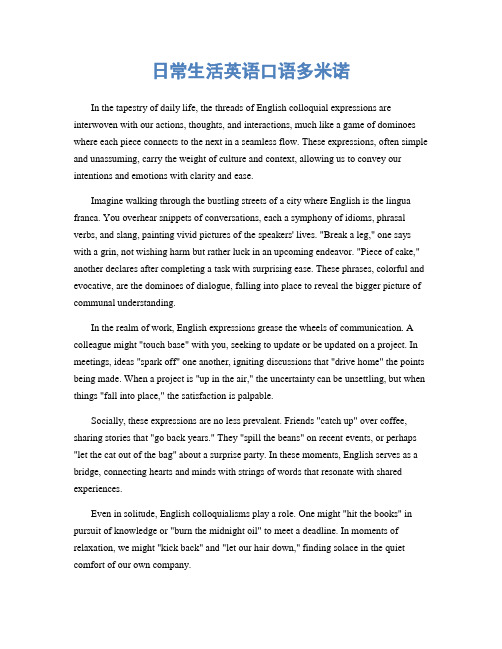
日常生活英语口语多米诺In the tapestry of daily life, the threads of English colloquial expressions are interwoven with our actions, thoughts, and interactions, much like a game of dominoes where each piece connects to the next in a seamless flow. These expressions, often simple and unassuming, carry the weight of culture and context, allowing us to convey our intentions and emotions with clarity and ease.Imagine walking through the bustling streets of a city where English is the lingua franca. You overhear snippets of conversations, each a symphony of idioms, phrasal verbs, and slang, painting vivid pictures of the speakers' lives. "Break a leg," one says with a grin, not wishing harm but rather luck in an upcoming endeavor. "Piece of cake," another declares after completing a task with surprising ease. These phrases, colorful and evocative, are the dominoes of dialogue, falling into place to reveal the bigger picture of communal understanding.In the realm of work, English expressions grease the wheels of communication. A colleague might "touch base" with you, seeking to update or be updated on a project. In meetings, ideas "spark off" one another, igniting discussions that "drive home" the points being made. When a project is "up in the air," the uncertainty can be unsettling, but when things "fall into place," the satisfaction is palpable.Socially, these expressions are no less prevalent. Friends "catch up" over coffee, sharing stories that "go back years." They "spill the beans" on recent events, or perhaps "let the cat out of the bag" about a surprise party. In these moments, English serves as a bridge, connecting hearts and minds with strings of words that resonate with shared experiences.Even in solitude, English colloquialisms play a role. One might "hit the books" in pursuit of knowledge or "burn the midnight oil" to meet a deadline. In moments of relaxation, we might "kick back" and "let our hair down," finding solace in the quiet comfort of our own company.However, the mastery of these expressions is not just about knowing their meanings but understanding the nuances of their use. It's about recognizing when to say "I'm all ears" to show attentiveness or "keep someone posted" to promise updates. It's about choosing the right moment to "call it a day" or knowing when to "step up your game."The beauty of English colloquial expressions lies in their ability to adapt and evolve, much like the game of dominoes itself. Each generation adds its own slang to the mix, reshaping the language to fit the contours of contemporary life. These expressions are not static; they are alive, breathing the essence of human creativity and adaptability.In conclusion, English colloquial expressions are the dominoes of daily communication, each one connected to countless others, forming chains of comprehension that span the globe. They are the building blocks of rapport, the shorthand of shared understanding, and the spice that flavors the stew of conversation. As we navigate the game board of life, let us appreciate the role these expressions play in keeping the dominoes falling smoothly, one after the other, in the endless dance of dialogue.。
同义词辨析:oral、colloquial、spoken、verbal
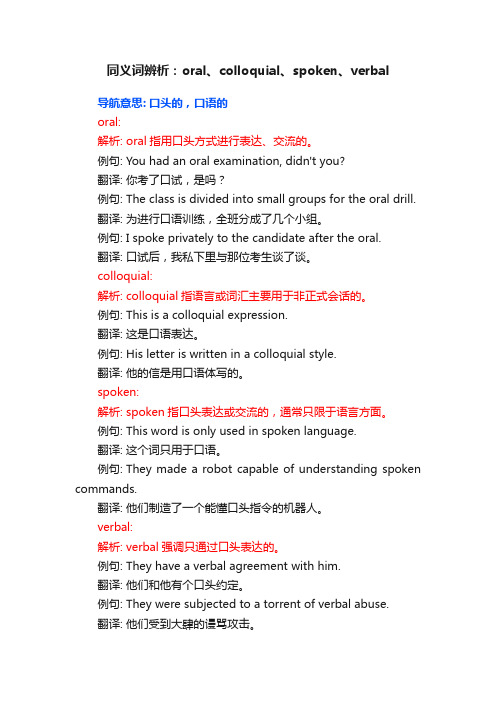
同义词辨析:oral、colloquial、spoken、verbal导航意思: 口头的,口语的oral:解析: oral指用口头方式进行表达、交流的。
例句: You had an oral examination, didn't you?翻译: 你考了口试,是吗?例句: The class is divided into small groups for the oral drill.翻译: 为进行口语训练,全班分成了几个小组。
例句: I spoke privately to the candidate after the oral.翻译: 口试后,我私下里与那位考生谈了谈。
colloquial:解析: colloquial指语言或词汇主要用于非正式会话的。
例句: This is a colloquial expression.翻译: 这是口语表达。
例句: His letter is written in a colloquial style.翻译: 他的信是用口语体写的。
spoken:解析: spoken指口头表达或交流的,通常只限于语言方面。
例句: This word is only used in spoken language.翻译: 这个词只用于口语。
例句: They made a robot capable of understanding spoken commands.翻译: 他们制造了一个能懂口头指令的机器人。
verbal:解析: verbal强调只通过口头表达的。
例句: They have a verbal agreement with him.翻译: 他们和他有个口头约定。
例句: They were subjected to a torrent of verbal abuse.翻译: 他们受到大肆的谩骂攻击。
- 1、下载文档前请自行甄别文档内容的完整性,平台不提供额外的编辑、内容补充、找答案等附加服务。
- 2、"仅部分预览"的文档,不可在线预览部分如存在完整性等问题,可反馈申请退款(可完整预览的文档不适用该条件!)。
- 3、如文档侵犯您的权益,请联系客服反馈,我们会尽快为您处理(人工客服工作时间:9:00-18:30)。
常用口语( Colloquial English )从事[在ɡ开斋节吗?D ] 占线信号:占线信号|忙音| 示忙信号你订婚了吗?B:不,先生。
你好,我能帮你吗?我想分享公司。
B:哦,跳进去。
-有人预定了你的车吗?-没有,先生。
您要车吗?- 去沙玲公司。
-上车吧。
请送我去甘乃迪机场。
不远处。
在那边。
请送我去肯尼迪机场。
- 不远,就在那儿。
我想去附近的城市,如果你不介意的话如果你不介意,我想看看街景我要去拜访一位朋友。
我要看一位朋友。
这条路对吗?我们的路线对吗?请带我去伦敦饭店。
B:好的。
我们什么时候到那里?一:尽快,因为我有一个重要的会议参加。
B:好吧,如果没有阻塞的话。
- 请送我去伦敦饭店。
-好吧,什么时候到?-越快越好,我要参加一个重要会议。
——好吧,只要路上不停车就行。
请派一辆出租车到格兰德酒店。
B:请问你的地址?A:162大街六号。
B:你什么时候要这个服务?答:4点30分。
谢谢. -请派辆出租车到格兰德饭店。
- 您的地址是?- 第六大街162 号。
-什么时候要车?4:30 ,谢谢。
我该付你多少钱?B:四美元五十美分。
答:这是五美元,你可以改变。
B:谢谢你。
- 我该付多少钱?4.5 美元。
-给你5美元,零头不用找了- 谢谢不用谢. 没关系,别客气。
谁知道!天晓得!没什么了不起。
没什么了不起!容易做到。
慢慢来。
别逼我。
别逼我。
这是紧急的。
有急事神的工作。
上帝的安排。
希望如此。
希望如此。
开始做生意。
言归正传。
不关我的事。
不关我事。
我不在乎. 我不在乎没有那么坏。
不错没有办法!不可能!别恭维我。
过奖了。
欢迎你。
你太客气了。
这是一个很长的故事。
一言难尽我们之间。
你知,我知大嘴巴!多嘴驴!当然!当然!我这就去。
我这就去。
不要介意. 不要紧。
可以-做。
能人。
闭上-。
特写镜头。
放弃它!停止!瓶!闭嘴!别装死!别装蒜!化妆!不记前嫌!注意你的嘴巴。
注意言辞。
有急事吗?有急事吗?出去吃怎么样?外面吃饭怎样?别做过头了!别太过分了你懂吗?你搞明白了吗?恐怕不行,我恐怕不能。
你想打赌吗?你想打赌吗?我替你去怎么样?我替你去怎么样?谁想要?谁稀罕?十二月的心跳。
黄昏恋。
我凭直觉做事。
凭直觉做某事。
吝啬鬼!小气鬼!见鬼去吧!去死吧!过来坐这儿。
来这边坐。
祝你好运! 祝你好运!画蛇添足。
画蛇添足。
成功. 达到目的,获得成功。
我会见到你的。
再见。
他有一把斧子要磨。
他另有企图。
我想如果你能送我一程吗?能让我搭一程吗?雨了。
要下雨了。
我可以要这个吗?。
可以给我这个吗?我可能听到大头针落地。
非常寂静。
你为什么这么肯定?怎么这样肯定?是这样的吗?是这样吗?别装了。
别喝醉了。
离他远点。
别靠近他。
不要戴高帽子。
别摆架子。
就在那里。
就在那里。
打包袋。
打包袋。
铃声响了。
听起来耳熟。
双耳睡觉。
睡的香。
逃学。
旷工、旷课。
你有没有钱?你身上带钱了吗?你的专业是什么?你学什么专业?我和女朋友分手了。
我和我的女朋友吹了这是曾经发生过的事。
蓝色的月亮。
这是千载难逢的事。
这是一个问题!一言为定!我会踢你的屁股。
我将炒你鱿鱼。
晚饭我请。
晚饭我请。
替我向大家问好。
替我向大家问好。
不精确!不见得,不一定!那是不公平的。
这不公平!我们没办法。
我们没办法。
那太好了。
太棒了!不客气! 别客气!爆炸!妈的!男孩!(表示惊奇,兴奋等)好家伙哇!从这出去滚出去!我不能使收支平衡。
我上个月接不到下个月,缺钱它可能是一个杀手。
这是个伤脑筋的问题。
死胡同。
死胡同。
坐下!请坐!在这里,你们!说得对!你要求它!活该!这怎么可能呢?真想不到!新鲜的油漆!油漆未干!他推运气。
他太贪心了。
我当家。
我当家。
它在空中。
尚未确定。
配菜。
配菜。
我洗耳恭听。
我洗耳恭听。
临阵退缩。
害怕做某事。
真为你高兴! 好得很!前进. 继续帮帮我。
帮帮我。
先把它搁置一旁。
先把它搁一边。
失去了头。
丧失理智。
说真的。
有话直说。
他真让人讨厌。
他真让人讨厌。
你有吸管吗?你有吸管吗?当然! 一定,当然!那是个男孩!太好了,好极了!这取决于你. 由你决定。
线路正忙。
占线。
我全力支持你。
我现在很忙。
不要捏造事实。
不要捏造事实。
小别胜新婚。
小别胜新婚。
她把事情搞得一塌糊涂。
她把事情搞得一塌糊涂看个够。
看个够。
他的眼睛很锐利。
他的眼睛很锐利拍摄微风。
闲谈告诉我什么时候!随时奉陪!世界真小!世界真是小!一点也不.根本就不(用)。
让我们见机行事。
让我们随兴所至。
等着瞧!等着瞧。
为什么这么忧郁?怎么垂头丧气?你怎么来了?什么风把你吹来了?坚持! 抓紧(别挂电话)!别管我. 别理我。
引体向上。
不气,振作些。
你永远不知道。
世事难料。
高杰克!举起手来(抢劫)!她为什么要嫁给一个年龄够大的男人?是她的父亲吗?她为什么要嫁给一个年龄与她父亲相当的男人?我大多数时间都在家里。
我多半在家里她几分钟后就会来。
他马上会过来。
我不是一个好心情。
没有心情(做某事)他是个吹牛大王。
他是个吹牛大王。
我无聊的要死。
我无聊死了。
干杯!干杯!大胆的!亲爱的!我们到了。
我们到了!我迷路了。
我迷路了。
她还在生我的气。
她还在生我的气。
我总有一天跟他扯平我总有一天跟他扯平撞天花板。
大发雷霆。
她身怀巨款。
她身怀巨款。
我没有地方可待。
没地方可去。
我很想见你。
我很想见你。
我以上帝起誓。
我对天发誓它质量上乘。
它质量上乘什么猫腻。
别耍花招。
你至少得道个歉。
你顶多道个歉就得了。
物价飞涨,如果再这样下去,我们就不能维持这种局面了。
物价直线上升,这样子下去,我们锅里可没什么东西煮饭。
你没有钥匙孔。
不准偷看。
来吧,理智点。
嗨,你怎么不讲道理。
你什么时候离开?你什么时候走?你不能这么说。
未必吧,不至于这样吧。
别误会我了。
别误会我。
你似乎不完全是你自己的你今天看起来不大对劲今天。
我不得不迟到,让我的约会等着。
我不喜欢迟到而让别人久等。
你介意少点声音吗?。
能不能小声点。
这不会占用你太多时间。
这不花你好多时间。
从长远来看。
从长远来说不是这样的。
这里没有这个人。
这里没有这个人他既不喝酒也不抽烟。
他既不喝酒也不抽烟。
违反规则。
违反规则。
你有多大?!你真棒!可怜的东西!真可怜!坚果! 呸;胡说;混蛋经典英文赞美别人1。
你今天看上去真棒。
(你今天看上去很棒。
)】【每天都可以用!2。
你干得很好。
(你干得非常好。
)】【国际最通用的表扬!三. 我们十分为你骄傲。
(我们十分为你骄傲。
)】【最高级的表扬!4。
我对你的工作很满意。
(我对你的工作非常满意。
)】【真诚的赞扬!5。
这真是个好地方。
它质量上乘。
它质量上乘这真是个好地方!)】【效果很好的表扬!6。
你看起来很帅!(你看上去真精神/真棒/ 真漂亮。
)】【与众不同的表扬!7。
你总是知道该说什么。
8。
你总是说话得体。
(你总是说话得体。
)】【高层次的表扬!9。
做的好!你做得很好。
(干得好!)】【极其地道的表扬!10。
这菜很好吃。
(好吃!)】【最普通、但非常重要的表扬!11。
每样东西都很美味。
(每样东西都很美味!)12。
你的儿子/ 女儿真可爱。
(你的孩子很可爱。
)13。
多么可爱的孩子!多么可爱的孩子。
)】【只管大胆用!14。
我钦佩你的工作。
15。
我尊重你的工作。
我对你的工作表示敬意。
)】【世界通用!16。
你的个性很好。
(你的个性很好。
)】【一个非常安全的表扬!17。
你真幽默。
(你真幽默。
)】【美国人极其喜欢的表扬!18。
你的中文令人惊讶。
(你的中文令人惊讶。
)19。
我真不敢相信你的英语。
(我真不敢相信你的英语。
)】【用了六星级形容词!20。
你的事业很成功。
(你的事业很成功。
21。
你非常专业。
你非常专业。
)】【专业化的表扬!21。
你非常专业。
22。
你的公司给我留下深刻的印象。
(你的公司给我留下深刻印象。
)23。
你非常聪明。
(你非常聪明。
)24。
我非常羡慕你。
(我非常羡慕你。
)25。
你的妻子很有魅力。
(你的妻子很有魅力!)26。
你们真是天生的一对。
(你们真是天生的一对!)27。
你很有天赋。
(你很有天赋。
)28。
你穿那种颜色很好看。
(你穿那种颜色很好看。
)29。
你还挺有品位的呦你很有品位。
)30。
你看起来像一百万美元。
你看起来很出色不可不懂的十句英语他妈的怎么回事?(到底他妈的怎么回事?)你个狗娘养的!(你个狗娘养的!)全体起立!(全体起立!)胡说八道![ 'bul ?] (胡说八道!屁话!)该死![M] (可恶!)这不关你的事![ 'biznis ] (关你屁事!)我没有选择!(俺也是被逼无奈啊!)我怎么能忘记一个这么漂亮的女孩/ 性感的男孩吗?我怎能忘记一个这么漂亮的女孩/ 性感的男孩是谁?耍狠十句话1。
只好等着看喽。
我不会让你得逞的。
咱们走着瞧。
我不会让你得逞的2。
你会后悔的你会后悔的。
三. 你会得到你想要的。
你会得到报应的。
4。
如果你想找人打架的话,不用找太远。
如果你想找人打架的话,不用找太远。
5。
说话当心点。
你知道你在跟谁说话吗?说话客气一点。
你知道你在跟谁说话吗?6。
我迟早会报复你的。
跟你的这笔帐我迟早会要回来的。
7。
听着,你找错吵架的对象了。
听着,你找错吵架的对象了。
8。
你最好收回那句话。
你最好收回那句话。
9。
你想到外头解决吗?任何时候!你想到外头解决(干架吗随时奉陪)?!10。
别惹我!/ 别跟我生气!不要惹我!/ 给我放尊重一点!11.ventilate 前区进入该区域前通风进入。
